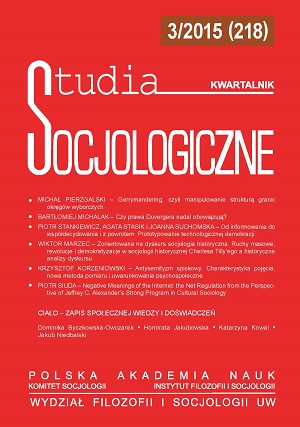Negative Meanings of the Internet: the Net Regulation from the Perspective of Jeffrey C. Alexander’s Strong Program in Cultural Sociology
Negative Meanings of the Internet: the Net Regulation from the Perspective of Jeffrey C. Alexander’s Strong Program in Cultural Sociology
Author(s): Piotr SiudaSubject(s): Social Sciences
Published by: Instytut Filozofii i Socjologii Polskiej Akademii Nauk
Keywords: cultural sociology; Jeffrey C. Alexander; Internet studies; regulation of the Internet; cyberoptimism; cyberpessimism
Summary/Abstract: Jeffrey C. Alexander, the founder of the strong program of cultural sociology, has described cultural meanings connected with the computer. Using the concepts of this prominent theoretician, this article relates his theories to the Internet. Perceiving the Net through a lens of cultural meanings, one must consider code and narrations. At the code level, the Internet falls within the sacral (sacred) sphere because it is believed to completely change social life. There are two narrations related to the Net, the positive and the negative one. In the case of the negative narration, many various motives may be identified. They are linked with the necessity to control both the very technology and its users. Although regulation of technology is primarily concerned with watching over the operations of large Internet firms, users must also develop appropriate habits in using the Net. The article is aimed at characterizing this regulation through qualitative analysis of publications by selected writers. The author argues that today the negative narration is connected with highlighting the misfortunes which are supposed to result from the lack of Internet regulations.
Journal: Studia Socjologiczne
- Issue Year: 218/2015
- Issue No: 3
- Page Range: 149-167
- Page Count: 19

